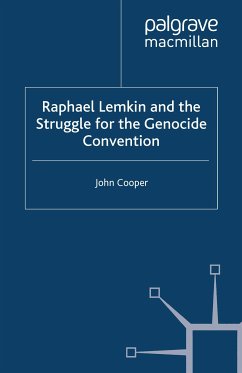
Raphael Lemkin and the Struggle for the Genocide Convention (eBook, PDF)
Versandkostenfrei!
Sofort per Download lieferbar
72,95 €
inkl. MwSt.
Weitere Ausgaben:

PAYBACK Punkte
36 °P sammeln!
This book is the first complete biography of Raphael Lemkin, the father of the United Nations Genocide Convention, based on his papers; and shows how his campaign for an international treaty succeeded. In addition, the book covers Lemkin's inauguration of the historical study of past genocides.
Dieser Download kann aus rechtlichen Gründen nur mit Rechnungsadresse in A, B, BG, CY, CZ, D, DK, EW, E, FIN, F, GR, HR, H, IRL, I, LT, L, LR, M, NL, PL, P, R, S, SLO, SK ausgeliefert werden.












